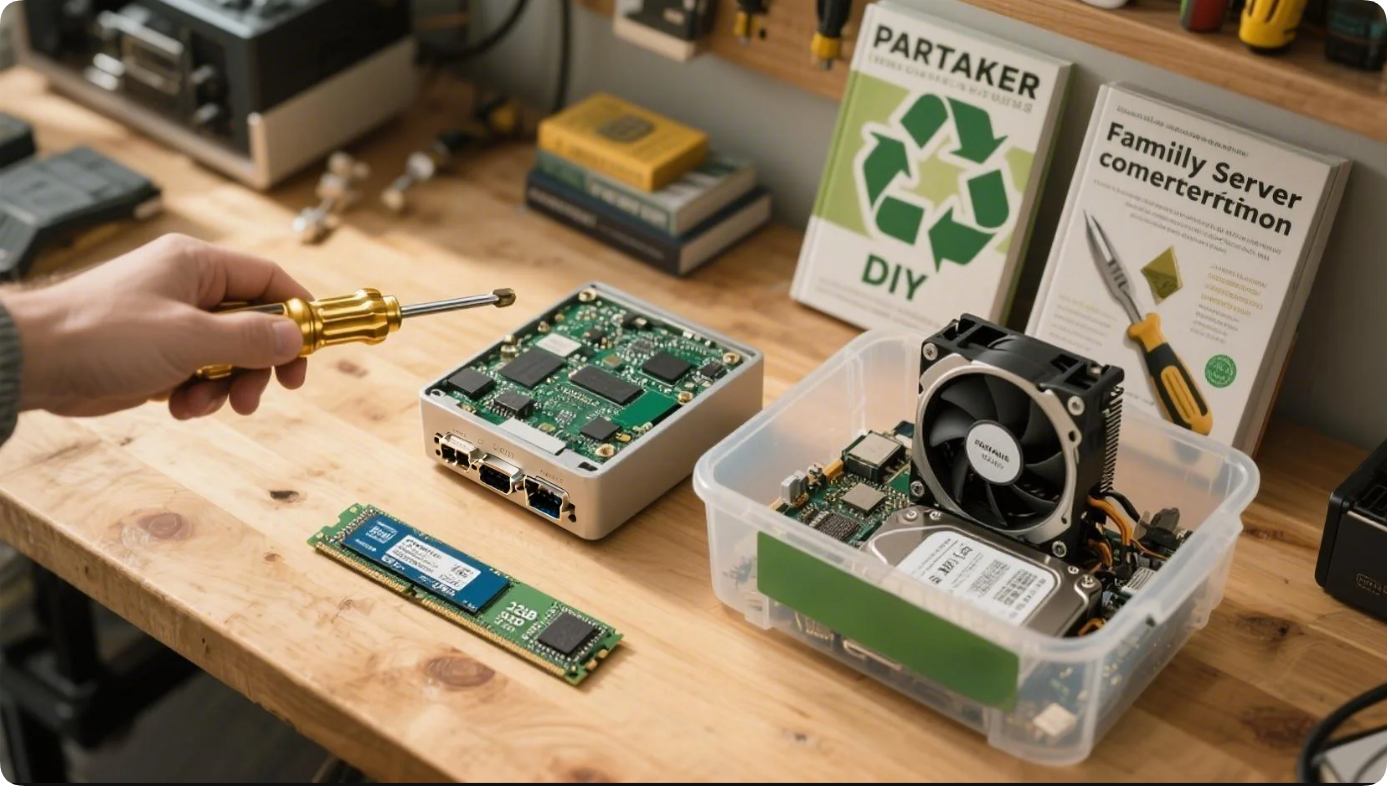The rise of smart homes and sustainable living has created a demand for energy-efficient technologies that reduce environmental impact without compromising performance. Enter fanless mini PCs—compact, silent, and rugged devices that are redefining home servers by merging eco-friendly design with intelligent energy management. From slashing electricity bills to enabling seamless integration with renewable energy systems, these devices are at the forefront of green computing. Let’s explore how fanless mini PCs are transforming home energy ecosystems.
Fanless mini PCs eliminate mechanical cooling systems, which account for up to 15% of traditional PC energy consumption. By leveraging passive cooling technologies like heat pipes and aluminum alloy chassis, these devices dissipate heat naturally while consuming minimal power. For example:
PARTAKER’s B8 Mini PC uses an Intel Core i7-1165G7 processor with a TDP of just 15W, achieving 4K video processing and multitasking while drawing 90% less power than standard desktops.
Beckhoff’s C6025 Industrial PC employs Intel Core i U-series processors, which deliver high performance at 10W idle power, ideal for 24/7 home server operations.
These systems also integrate energy-saving features like 80Plus Platinum-certified power supplies (e.g., the Enhance 7660B) and modular storage designs that allow users to scale capacity without adding redundant hardware.
Traditional servers often become obsolete within 3–4 years due to component wear or thermal throttling. Fanless mini PCs, however, offer:
Extended Lifespans: With no moving parts, devices like ADLINK’s Matrix series boast a <1% failure rate over 5 years, reducing replacement cycles.

Modular Upgrades: PARTAKER’s models support DDR4 RAM expansion, dual M.2 SSDs, and 2.5-inch HDDs, allowing users to upgrade storage or memory without discarding the entire system.
A case study from a DIY enthusiast community shows how repurposing an old X99 motherboard with a fanless design extended its lifespan by 3 years, avoiding 50 kg of e-waste.
Fanless mini PCs excel as hubs for home energy systems:
Renewable Integration: Devices like the Shuttle DS10U connect to solar inverters and battery management systems, optimizing energy distribution based on real-time usage data.
IoT Coordination: With dual-band Wi-Fi and 6x 2.5GbE ports (e.g., PARTAKER’s firewall appliance), these PCs manage smart thermostats, LED lighting, and HVAC systems, reducing household energy consumption by 20–30%.
Edge Computing for Sustainability: Local AI processing (e.g., load forecasting algorithms) eliminates reliance on energy-intensive cloud servers.
Noise pollution is a hidden cost of traditional servers. Fanless designs address this while maintaining reliability:
Zero-Decibel Performance: MeLE’s Fanless Mini PC Stick Pro operates at 0dB, making it ideal for bedrooms or living spaces.
Extreme Environment Adaptability: Aluminum enclosures with IP65 ratings (e.g., ADLINK’s Matrix) withstand temperatures from -40°C to 70°C, enabling deployment in garages or attics without air conditioning.
DIY projects demonstrate creative thermal solutions, such as using magnetic mesh panels or phase-change materials to enhance heat dissipation in compact setups.
Home Energy Monitoring
A fanless mini PC running open-source software like Home Assistant can track electricity usage across devices, identifying energy hogs (e.g., old refrigerators) and saving $200+ annually.
Media Server Optimization
Replacing a 150W NAS with a fanless mini PC (e.g., PARTAKER B8) cuts power consumption by 70%, while M.2 SSD storage eliminates mechanical drive noise.
Off-Grid Solutions
In rural Kenya, solar-powered fanless PCs provide offline access to educational content, reducing reliance on fossil-fuel generators.
AI-Driven Energy Harvesting: Future models may integrate NPUs to optimize solar/wind energy usage based on weather forecasts.
5G-Enabled Microgrids: Fanless edge clusters could coordinate energy sharing between homes, leveraging devices like Thundercomm’s IoT gateways.
Blockchain for Carbon Credits: Decentralized ledgers running on low-power mini PCs may track and trade household carbon savings.
Fanless mini PCs are more than silent workhorses—they are catalysts for sustainable living. By combining energy efficiency, upgradability, and smart integration, these devices empower homeowners to reduce carbon footprints while achieving cost savings. As innovators like PARTAKER and ADLINK continue to push boundaries, the vision of a net-zero home becomes increasingly attainable. For eco-conscious consumers, adopting a fanless home server isn’t just a choice; it’s a step toward a greener future.
At BVS, we specialize in developing and manufacturing high-performance industrial embedded computers. Our product range includes rugged embedded box PCs, fanless industrial computers, and custom embedded solutions designed for various industries. We focus on creating reliable, high-performance systems that withstand harsh industrial environments. Our embedded PCs feature industrial-grade components and advanced thermal management systems, ensuring consistent performance in challenging conditions. Whether it's a compact embedded PC for space-constrained applications or a powerful industrial computer for complex data processing tasks, we have the expertise to deliver tailored solutions that meet the unique requirements of real-time data processing in industrial settings.

Click to confirm
Cancel